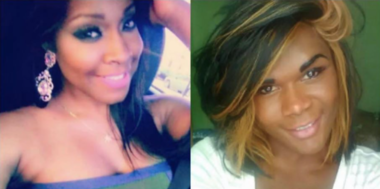Killings of 2 transgender women spread fear, raise concerns

NEW ORLEANS (AP) — The separate slayings of two transgender women in New Orleans late last month are bringing renewed attention to the oftentimes tense relationship between the city's LGBT community and police department, with advocates saying mistreatment by police has discouraged many transgender people from seeking law enforcement's help — making them easier targets of violence.
Now, as police investigate the killings of Chyna Gibson and Ciara McElveen, LGBT advocates are hoping to spark a dialogue with the New Orleans Police Department, including at a town hall meeting being organized for Friday. The future of that conversation could be shaped by how investigators go about probing last month's killings, advocates said.
New Orleans police have said they have not found evidence suggesting the killings of Gibson, 31, and McElveen, 25, were connected or that the women were targeted because of their gender identity. But for some transgender people and LGBT organizers, the two crimes occurring less than 48 hours apart is alarming.
"They say it's not a hate crime, but I don't understand why the transgender community is targeted point blank," said Dheran Dupree, a close friend of McElveen.
Dupree spoke Sunday night at a vigil held for McElveen, standing above a cluster of candles that spelled "Ciara." That night, a photo of McElveen hung from the chainlink fence at a street corner in the 7th Ward, where police found her stabbed several times and lying on the ground around 9 a.m. on Feb. 27. She later died at a hospital.
Gibson was shot Feb. 25, in New Orleans East. Police found her body lying between two cars parked in front of a clothing store.
Solving these and other similar crimes often proves tricky, given the distance between police and the LBGT community, advocates said. They hope to breach the issue at a town hall meeting Friday at which they want to discuss violence against transgender people. The meeting, which is open to the public, starts at 3 p.m. at First Unitarian Universalist Church of New Orleans.
Speaking Sunday, Dupree recounted being stopped several times by officers while just walking down the street, being placed in handcuffs and put in the back of a squad car, then questioned and asked for identification before being released without being cited or arrested and with no explanation for the stop.
Such experiences, Dupree said, cause her and others in the LGBT community to avoid approaching police for help or to report crimes — and, by their silence, the cycle of violence worsens, advocates say.
"The problems with police lead to a lack of trust that disconnects people from feeling safe with police," said Jai' C. Shavers, lead youth organizer for the New Orleans advocacy organization BreakOUT! "There's a feeling like you can't lean on them for support and safety."
Survey data from BreakOUT! indicates a high percentage of transgender people in the city share that sentiment. According to a 2014 report by the group, at least 33 of 40 transgender New Orleanians surveyed reported feeling "they have been targeted by police for their sexual orientation or gender identity or gender expression."
"You're scared to talk to (police)," Dupree said. "You're scared because they harass you, and also because of the statement they made."
Dupree was referring in particular to a news conference by NOPD Cmdr. Doug Eckert after McElveen's killing. Eckert concluded the news conference with statements that transgender people "should know who you're going to go see" and that they are arranging meetings through social media.
Eckert said investigators had "no information" on whether Gibson or McElveen had planned to meet with anyone at the time of their murders. But his statements were taken by many in the LBGT community as police insinuations, without evidence, that the victims were sex workers.
NOPD Sgt. Frank Robertson, who for the last two years has served as the department's liaison with the local LGBT community, said this week Eckert's comments were meant to be taken broadly as general safety advice — not as an assumption that risky behavior by some transgender people leads to violence.
"'Be careful who's in your company': that's just a general statement," Robertson, a 15-year NOPD veteran, said. "I think that he was speaking in general terms to the LGBT community," he said of Eckert.
As for the alleged harassment described by Dupree, Robertson said he can say "for a fact" that New Orleans officers do not make arbitrary stops based on a person's sexual orientation or gender. NOPD spokeswoman Dawne Massey added that officers wear body cameras that would show proof of harassment, and anyone who feels mistreated by an officer may file a complaint to have an investigation opened that will incorporate body-worn camera footage.
"That's not our practice," Robertson said. "We stop individuals based on if a crime is committed, or we strongly believe a crime is about to be committed."
But Robertson said he understands the importance of communication to ease fears of approaching officers.
"We are listening, and we will listen," Robertson said. "I don't want anybody from the LGBTQ community to feel afraid to come to the police. We want members of the LGBTQ community to come forward, and we want the community to feel comfortable with us."
___
By Beau Evans, The Times-Picayune.
Copyright Associated Press - The Gayly 3/9/2017 @ 12:55 p.m. CST





